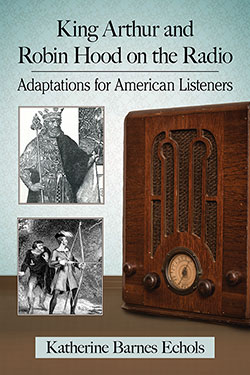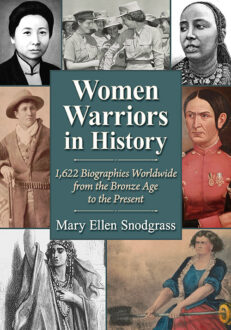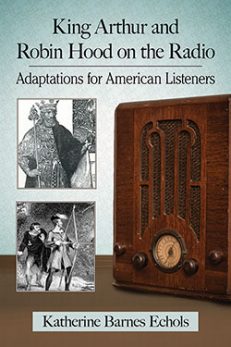King Arthur and Robin Hood on the Radio
Adaptations for American Listeners
Original price was: $29.95.$23.99Current price is: $23.99.
In stock
About the Book
Before stories of King Arthur and Robin Hood were adapted and readapted for film, television and theater, radio scriptwriters looking for material turned to Thomas Malory’s Le Morte Darthur (1485) and Howard Pyle’s The Merry Adventures of Robin Hood (1883). Throughout the 1930s to the mid–1950s, their legends inspired storylines for Abbott and Costello, Popeye, Let’s Pretend, Escape, Gunsmoke, The Adventures of Superman and others. Many of these adaptations reflect the moral and ethical questions of the day, as characters’ faced issues of gender relations, divorce, citizenship, fascism, crime and communism in a medieval setting.
About the Author(s)
Bibliographic Details
Katherine Barnes Echols
Format: softcover (6 x 9)
Pages: 216
Bibliographic Info: notes, bibliography, index
Copyright Date: 2017
pISBN: 978-1-4766-6704-1
eISBN: 978-1-4766-3000-7
Imprint: McFarland
Table of Contents
Table of Contents
Introduction 1
Prologue: When Radio Filled the Ether with “Winged Words” 11
1. Radio and the Formation of the Imagined Community 27
2. Adapting King Arthur and Robin Hood’s Legend for Radio 35
3. What Is Radio Medievalism? 56
4. Adapting Malory’s Le Morte Darthur for Radio 85
5. The Chivalric Ethos of the Comic Hero: Superman and Prince Valiant 116
6. White Knight of the Range: The Arthurian Knight in the Radio Western 134
7. Radio Adaptations of Robin Hood 146
8. Lighthearted Adaptations 178
Chapter Notes 189
Bibliography 192
Index 201
Book Reviews & Awards
“describe American radio adaptations of the King Arthur and Robin Hood legends airing between the 1930s and mid–1950s and how radio episodes demonstrate the medieval British ideal of chivalric knighthood as a standard of American morality and masculinity and defined the difference between “good and ‘bad’ conduct by emphasizing a character’s chivalric qualities”—ProtoView.





